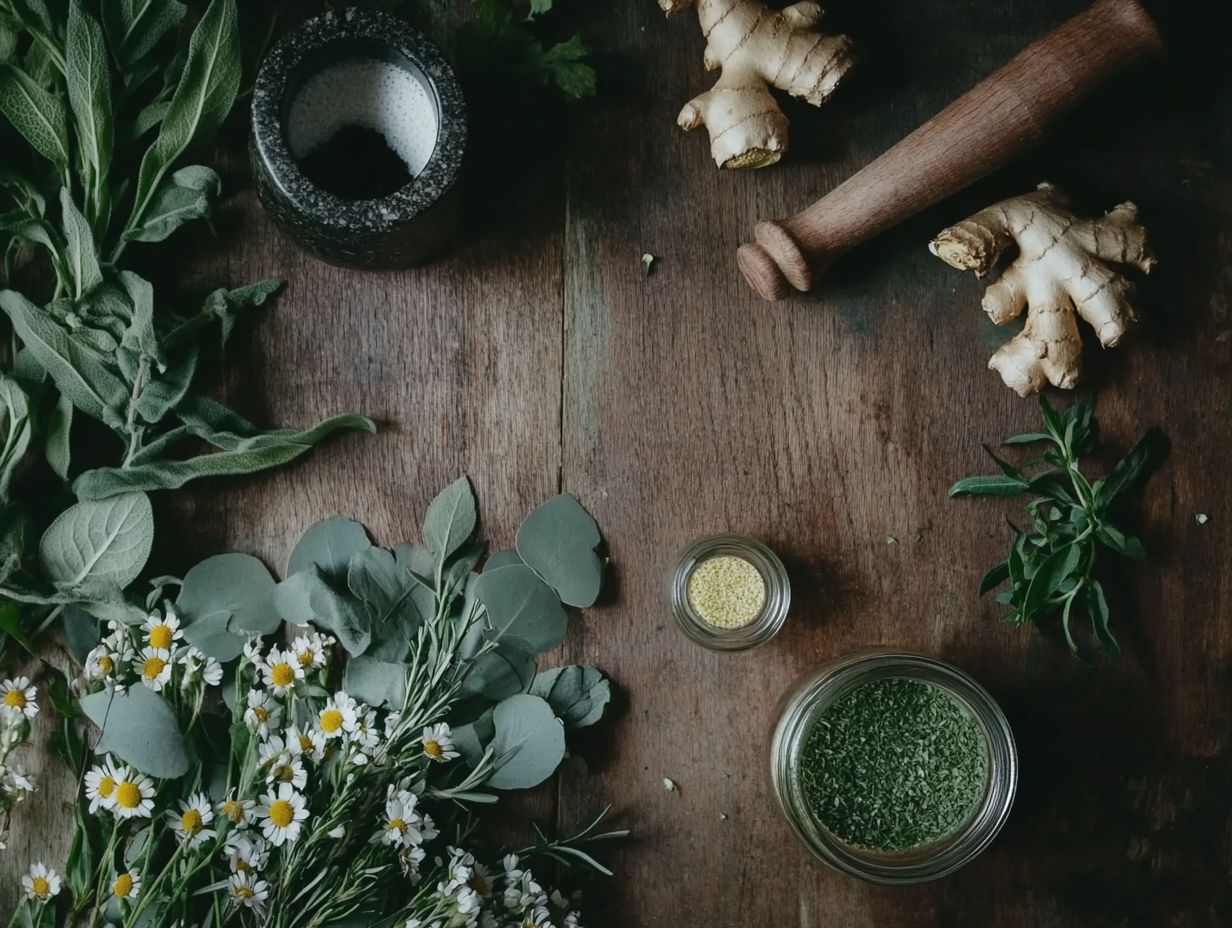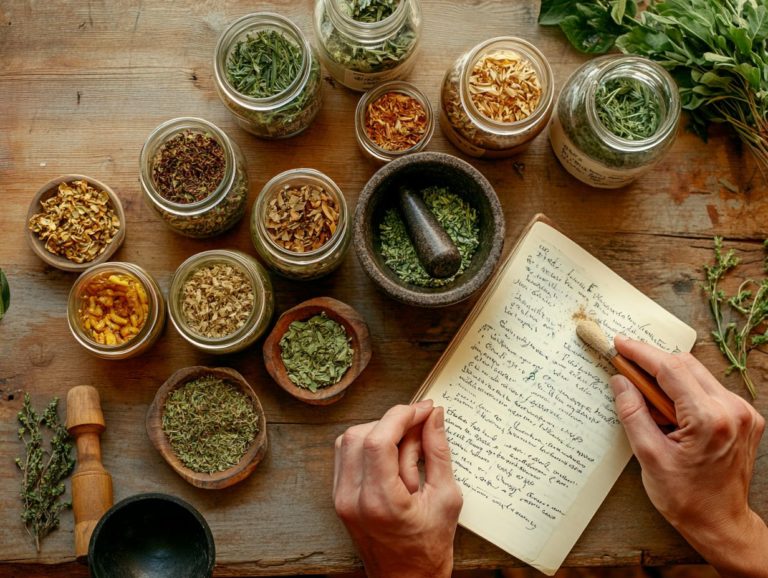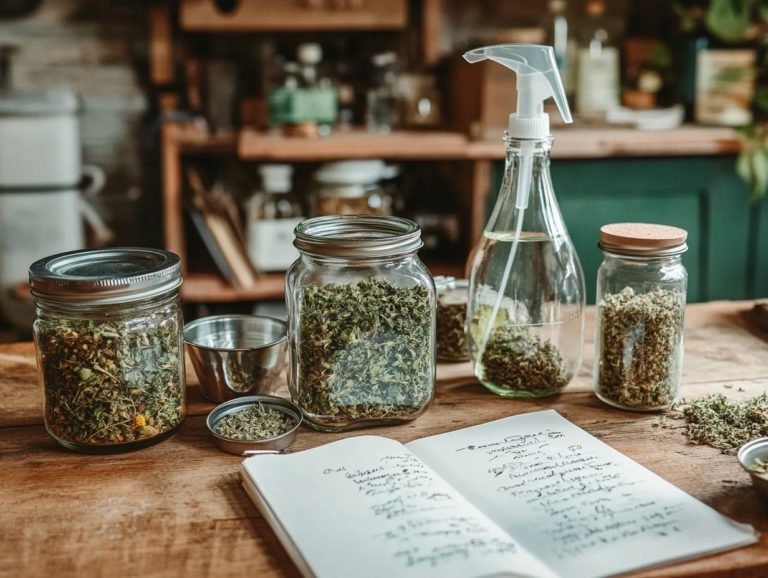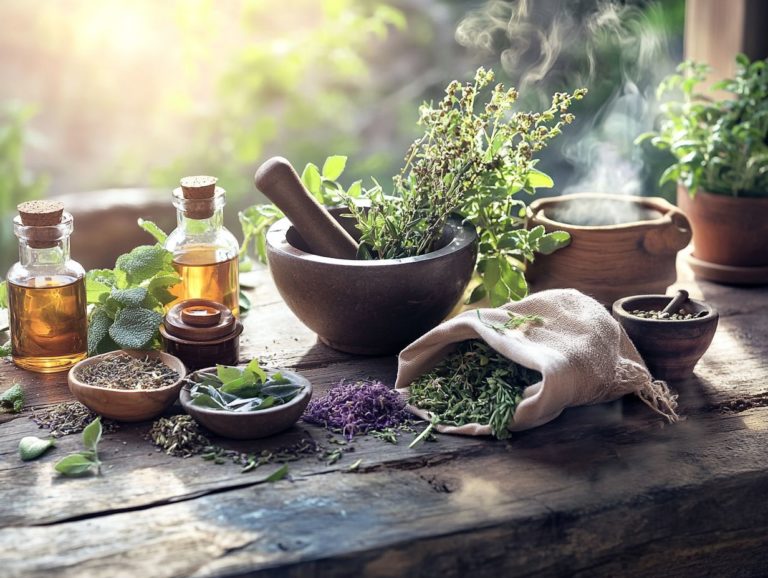Creating Herbal Remedies for Cold Symptoms
Colds have a knack for showing up at the most inconvenient times, don t they? Understanding the symptoms and causes is crucial for tackling this pesky ailment head-on.
The good news is that nature is brimming with herbal remedies that can offer you the relief you seek. This article delves into the signs of a cold, highlights the benefits of various herbal ingredients, and introduces specific herbs that can aid your recovery.
You’ll also find straightforward preparation methods and proper dosages, allowing you to tap into nature s healing powers for a faster recovery. Jump in and discover how you can alleviate your cold symptoms with the wisdom of herbs!
Contents
- Key Takeaways:
- Understanding Cold Symptoms
- Benefits of Herbal Remedies for Colds
- Herbs to Use for Cold Symptoms
- Preparing Herbal Remedies
- Using Herbal Remedies for Cold Relief
- Proper Dosage and Administration
- Other Natural Remedies for Colds
- Alternative Methods for Treating Cold Symptoms
- Frequently Asked Questions
- What are some common herbal remedies for cold symptoms?
- Can herbal remedies really help with cold symptoms?
- Are there any potential side effects of using herbal remedies for cold symptoms?
- How can I create my own herbal remedies for cold symptoms?
- Are there any precautions I should take when using herbal remedies for cold symptoms?
- How long does it typically take for herbal remedies to work for cold symptoms?
Key Takeaways:

- Herbal remedies are a natural and effective way to treat cold symptoms, providing relief without the use of harsh chemicals or drugs.
- Understanding the various herbs and their specific effects can help in creating the most effective herbal remedy for your cold symptoms.
- Proper preparation and administration of herbal remedies are essential for safe and effective relief from cold symptoms.
Understanding Cold Symptoms
Understanding cold symptoms is essential for providing effective home care and treatment, particularly if you re a parent concerned about your child’s health. Common indicators of a cold include coughing, which can be exacerbated by nasal congestion that irritates your throat, nasal congestion, and mucus production, which can lead to discomfort and complications like a sore throat or even ear infections.
The American Academy of Pediatrics (AAP) emphasizes the importance of recognizing these symptoms early. By doing so, you can implement appropriate remedies and care strategies, whether that means relying on home remedies or seeking medical intervention.
Common Signs and Causes
Common signs of a cold often include a persistent cough, nasal congestion, and an increase in mucus production, which can irritate your throat.
These symptoms often appear gradually, tempting you to brush them off as mere nuisances. However, as the days roll on, they can intensify in severity. What starts as a runny nose may morph into sinus pressure, while that relentless cough can sap your energy, making even simple daily tasks feel daunting.
Often, these signs stem from infections caused by germs that spread easily, particularly in those colder months when everyone huddles indoors. If you let these symptoms go untreated, the interplay of discomfort can exacerbate any underlying health issues, leading to more serious conditions like bronchitis or pneumonia.
Recognizing and addressing these signs early can be crucial for preventing such complications, ensuring you maintain your well-being.
Benefits of Herbal Remedies for Colds
Herbal remedies present a simple and effective way to alleviate cold symptoms, harnessing the remarkable healing properties of herbs such as ginger, garlic, and echinacea. These natural solutions not only provide relief but also fortify your immune system, allowing you to embrace wellness with confidence.
Act quickly to relieve your symptoms! Stay healthy and take care of yourself with nature s remedies!
Natural Ingredients and Their Effects
Discover the power of natural ingredients like echinacea, garlic, and ginger! These herbs can help alleviate cold symptoms and boost your wellness.
These herbal remedies not only address the discomfort that comes with colds but also strengthen your immune system, helping you fend off future illnesses. You might find echinacea particularly effective, often enjoyed as a tea or tincture, serving as a reliable immune booster.
Garlic, with its impressive antiviral and antimicrobial properties, can be seamlessly integrated into your meals or steeped in honey for a soothing syrup.
Ginger, renowned for its anti-inflammatory effects, can be brewed into a spicy tea or added to soups for that extra warmth and relief. You can combine these ingredients with mentholated rubs for chest congestion to manage symptoms effectively.
Saline drops are also effective in alleviating nasal congestion, providing you with gentle relief when you need it most.
Herbs to Use for Cold Symptoms

You can effectively employ various herbs to alleviate cold symptoms. Consider using cayenne for its heat and decongestive properties, peppermint to soothe your throat, and thyme for its antimicrobial benefits.
Each of these herbs offers unique advantages that can enhance your recovery and provide relief during a cold.
Types of Herbs and Their Uses
Types of herbs like cayenne, peppermint, rosemary, and thyme each boast unique therapeutic properties, making them ideal allies against various cold symptoms.
These plants not only help alleviate discomfort associated with seasonal colds but also promote overall wellness. For instance, cayenne is rich in capsaicin, a compound that helps relieve congestion and enhances circulation particularly beneficial when you’re dealing with congestion.
Peppermint, with its soothing aroma and menthol content, is a fantastic remedy for headaches, providing a refreshing sensation. Rosemary, renowned for its antimicrobial qualities, can be brewed into a comforting tea to soothe a sore throat. Meanwhile, thyme has long been a staple in herbal remedies for combating coughs.
To prepare these herbs, steep dried leaves in hot water for tea or use them in steaming infusions, often sweetened with honey or brightened with lemon for enhanced flavor and additional healing benefits. You can also explore crafting your own herbal remedies at home for a more personalized approach.
Preparing Herbal Remedies
Preparing herbal remedies can be both straightforward and fulfilling. You can explore methods such as crafting soothing herbal teas infused with ginger and garlic or developing tinctures with an array of potent cold-fighting herbs.
Methods and Recipes for Making Herbal Remedies
There are numerous methods and recipes for crafting your own herbal remedies, such as brewing herbal tea, creating tinctures, and mixing herbs with honey for enhanced benefits. Incorporating these techniques into your wellness routine can be both rewarding and advantageous.
For instance, consider brewing a simple herbal tea using dried chamomile flowers. Just steep them in boiling water for about five minutes, and you’ll have a soothing drink that’s perfect for alleviating stress and promoting better sleep.
If tinctures intrigue you, try blending equal parts of dried echinacea root and alcohol. Let it steep for several weeks, and you’ll end up with a powerful immune booster.
Regarding mixing herbs with honey, think about combining raw honey with freshly chopped ginger and lemon zest. Allow the mixture to infuse for a few days, and you’ll have a delightful natural remedy for colds.
Always remember to be mindful of dosage and any potential allergies, ensuring that your herbal concoctions remain safe and effective.
Using Herbal Remedies for Cold Relief
Utilizing herbal remedies for cold relief necessitates a keen awareness of the appropriate dosage and administration techniques. By mastering these aspects, you can harness their full benefits while avoiding any potential adverse effects.
Try these remedies today and take your first step toward feeling better!
Proper Dosage and Administration

Proper dosage and administration of herbal remedies are critical for ensuring both safety and effectiveness, especially when addressing cold symptoms in children and adults alike.
Determining the right dosage involves considering various factors, such as your age, overall health, and the severity of your symptoms. Children need lower doses than adults due to their smaller body size and different metabolic rates. It s essential to start with the lowest recommended dose and monitor for any side effects. If you have pre-existing health conditions, proceed with caution, as certain herbal ingredients may interact negatively with your medications.
Before embarking on any herbal treatment, consulting with a health professional is crucial. They can offer personalized guidance and help ensure that your experience is both safe and effective.
Other Natural Remedies for Colds
Along with exploring herbal remedies, consider a range of other natural solutions for colds.
A humidifier helps maintain moist air, creating a more comfortable environment. Saline drops effectively relieve nasal congestion, providing you with gentle relief when you need it most.
Alternative Methods for Treating Cold Symptoms
Alternative methods for treating cold symptoms can be just as effective as traditional remedies. Consider options like using a humidifier, saline drops, and a nasal aspirator a tool that helps clear nasal congestion.
By incorporating these strategies, you may find relief from the uncomfortable effects of a cold without relying solely on over-the-counter medications. Humidifiers play a crucial role by adding moisture to dry air, soothing sore throats and making breathing easier, especially at night. Saline drops help thin mucus, providing immediate relief, while nasal aspirators effectively tackle stubborn congestion particularly useful for young children.
Try these simple methods at home for quick relief and comfort! Incorporating DIY herbal remedies for common cold relief can support a quicker recovery and minimize the discomfort associated with a cold.
Frequently Asked Questions
What are some common herbal remedies for cold symptoms?
Some common herbal remedies for cold symptoms include ginger, echinacea, elderberry, and garlic.
Can herbal remedies really help with cold symptoms?

Yes, many herbs have natural properties that can help boost the immune system and relieve symptoms of the common cold.
Are there any potential side effects of using herbal remedies for cold symptoms?
While herbal remedies are generally safe, some individuals may experience allergic reactions or interactions with other medications. It’s important to consult with a healthcare professional before starting any herbal treatment.
How can I create my own herbal remedies for cold symptoms?
You can create herbal remedies at home by steeping herbs in hot water to make teas or by infusing them in oils or alcohol to make tinctures. It’s important to research proper dosages and methods of preparation before making your own remedies.
Are there any precautions I should take when using herbal remedies for cold symptoms?
Yes, it’s important to be aware of any potential interactions with medications or existing health conditions. Some herbs may not be suitable for pregnant women or individuals with certain medical conditions.
How long does it typically take for herbal remedies to work for cold symptoms?
The effectiveness of herbal remedies can vary depending on the individual and the severity of their symptoms. Generally, it may take a few days to a week to see improvement in cold symptoms when using herbal remedies.






